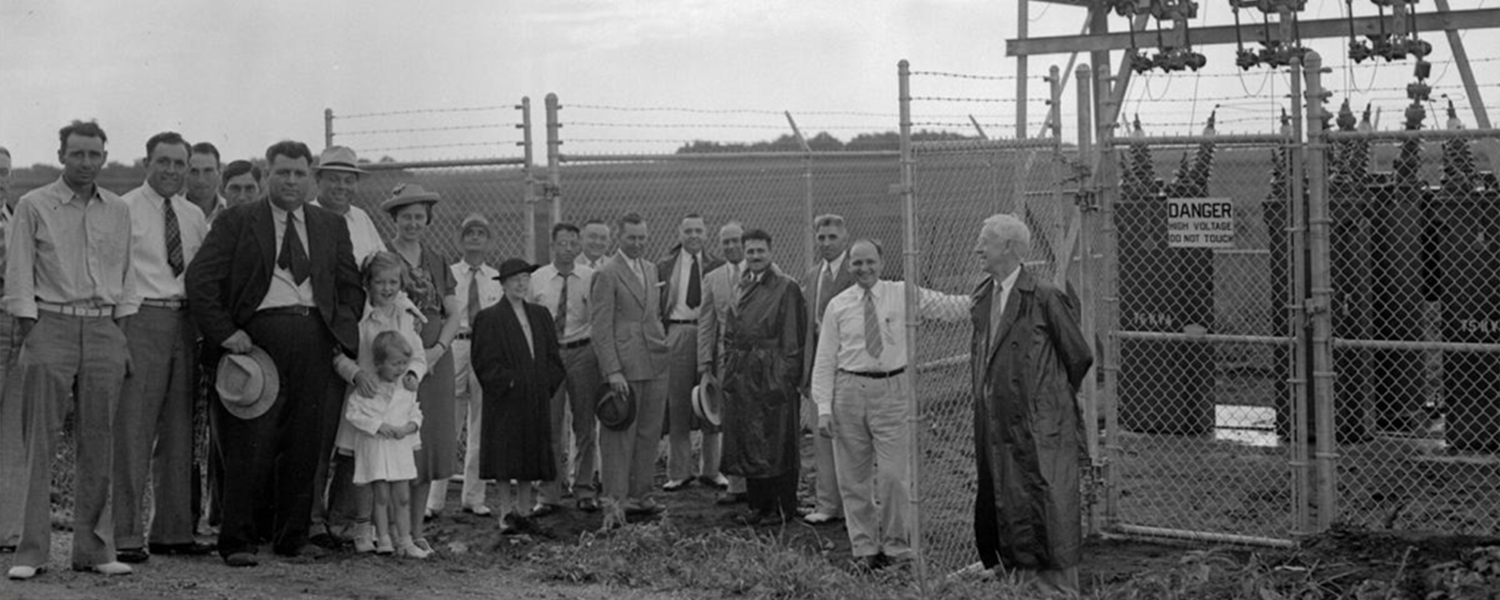Energy Democracy
Rural electric cooperatives (co-ops) serve the critical electricity needs of rural Illinoisans. Prairie Rivers Network is working to ensure that they are poised to take advantage of clean energy and be part of tackling the climate crisis. This work requires an understanding of their history and the unique challenges limiting opportunities for the rural energy transition.
Co-ops Electrified Rural America
Rural electric cooperatives (co-ops) were formed in the late 1930s as part of the New Deal. At that time, utilities had electrified urban areas but were unwilling to expand into rural locations. With drastically less customers per mile of line, the electrification of rural America was deemed unprofitable. The Rural Electrification Act of 1936 addressed this deficiency by making low-cost loans available directly to the areas that needed electrification the most through the creation of co-ops.

Each co-op shares a similar origin story; local people, business owners, and farmers took the initiative to sign up their neighbors as the first customers of their own cooperative. Today, these cooperatives are a mainstay of rural communities providing steady access to electric energy and other services like broadband. Co-ops distribute electricity to over 360,000 electric meters in Illinois.
Rural homes, farms, and businesses get their power delivered by their “distribution co-op.” These co-ops are owned and governed by the members they serve. The members elect fellow members to a Board of Directors. In most situations, distribution co-ops join together to form a larger generation and transmission co-op (G&T co-op) that focuses on generating and transmitting electricity over long distances, from power plants to the distribution co-ops. G&T co-ops invest in and often own and operate power generation facilities.
Problem: Co-ops Being Left Behind
Rural electric cooperatives have fallen behind in the ongoing renewable energy transition. Unlike investor-owned utilities such as ComEd and Ameren, cooperatives are not subject to rate oversight or our state’s renewable energy goals. While most coal-fired power plants in Illinois have closed or are slated for retirement by 2027, Illinois’ co-ops are tied to membership with larger G&T co-ops that own coal plants expected to operate for decades to come. In Illinois, G&T co-ops own the Lake of Egypt Coal Plant and the Prairie State Coal Plant. They have long-term contracts to procure fossil fuel power from other facilities as well.
Additionally, the renewable energy goals and programs for solar and energy efficiency that were created in Illinois’ Climate and Equitable Jobs Act don’t support co-op customers in the same way they support customers of Ameren and Com-Ed. Co-ops lack transparency and often limit members’ democratic access to decision-making. For example, co-op board elections are highly restrictive affairs marred by 2-7% voter turnout that rely on in-person member voting during co-op Annual Meetings. Only one Illinois co-op provides voting opportunities by mail. Furthermore, decisions made at the G&T co-op level don’t often reflect the best interests of individual distribution co-ops.
These are just a few examples of the challenges with transparency, lack of planning, and democratic access in the governance and power supply of co-ops. Similar problems exist for municipally owned utilities, like Naperville and other members of the Illinois Municipal Electric Agency. To provide equitable access to clean energy, reduce fossil fuel pollution, and tackle climate change, we must explore solutions to hasten the clean energy transition of co-ops in Illinois.
Solution: Opportunity for Rural Co-ops to Lead Clean Energy Future
Renewable energy prices have plummeted in the last decade, and federal funding to hasten the clean energy transition is at unprecedented levels. Co-ops are located in rural areas where enormous potential exists for renewable energy infrastructure. There is an opportunity for rural co-ops to be leaders in the clean energy future.
Prairie Rivers Network is working to ensure co-ops and their members understand this opportunity and have the tools necessary to address the unique challenges. Learn more about our work below. You can reach out to PRN’s Rural Energy Organizer for more information.
- Research. PRN recently co-launched the Rural Energy Cooperative Scorecard Initiative (RECSI). The initiative is a partnership across several Midwest States that will track the organizational progress of rural co-ops. The scorecard will serve as a tool for co-op member-owners, co-op leadership, advocates, and policy makers to help gauge transparency and democratic governance. Similar scorecard initiatives have been conducted in Minnesota and the Southeast.
- Legislation. PRN and partners in the Illinois Clean Jobs Coalition are working to develop and pass legislation that would increase the transparency and democratic governance of co-ops and municipal utilities.
- Organizing and Outreach. We are working to help co-op member-owners understand their role in their co-op and provide tools to help them call for a clean energy future that benefits everyone.







